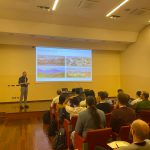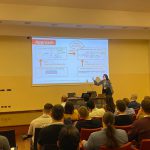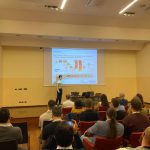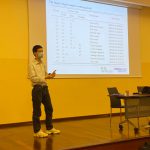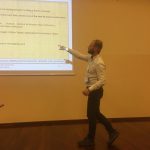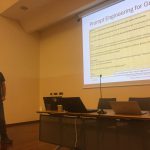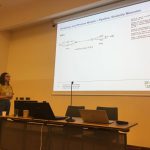The Eighth International Workshop on Process Querying, Manipulation, and Intelligence (PQMI 2023) aims to provide a high-quality forum for academics and practitioners to exchange research findings and ideas on methods and practices in the corresponding areas. Process Querying combines concepts from Big Data and Process Modeling and Analysis with Business Process Intelligence and Process Analytics to study techniques for retrieving and manipulating models of processes, both observed and recorded in the real-world and envisioned and designed in conceptual models, to systematically organize and extract process-related information for subsequent use. Process Manipulation studies inferences from real-world observations for augmenting, enhancing, and redesigning models of processes with the ultimate goal of improving real-world business processes. Process Intelligence looks into the application of representation models and approaches in Artificial Intelligence (AI), such as knowledge representation, search, automated planning, reasoning, natural language processing, explainable AI, autonomous agents, and multi-agent systems, among others, for solving problems in process mining, that is automated process discovery, conformance checking, and process enhancement, and vice versa using process mining techniques to tackle problems in AI. Techniques, methods, and tools for process querying, manipulation, and intelligence have applications in Business Process Management and Process Mining. Examples of practical problems tackled by the themes of the workshop include business process compliance management, business process weakness detection, process variance management, process performance analysis, predictive process monitoring, process model translation, syntactical correctness checking, process model comparison, infrequent behavior detection, process instance migration, process reuse, and process standardization.
PQMI 2023 will be held in conjunction with the 5th International Conference on Process Mining (ICPM 2023).
Follow us on twitter and visit the IEEE Task Force on Process Mining.
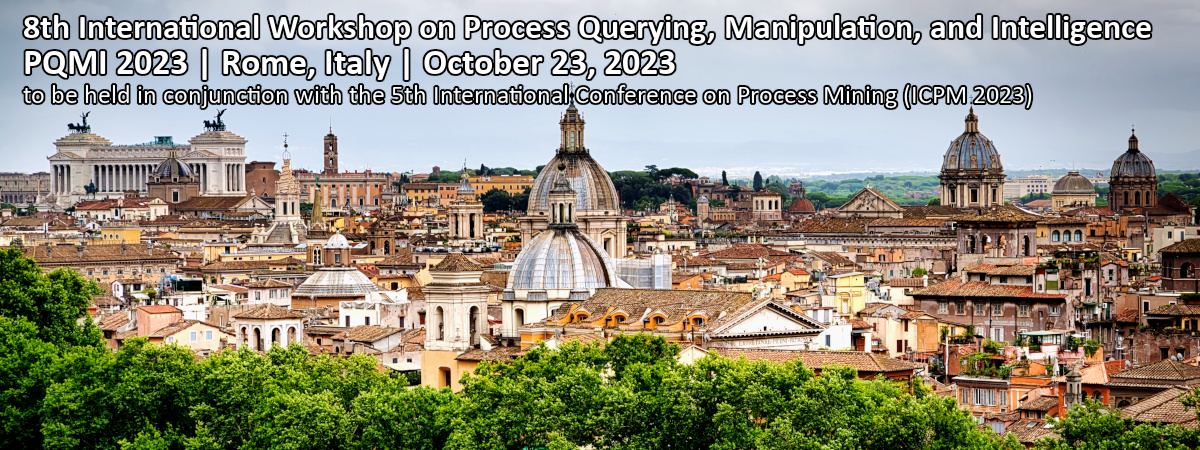
PROGRAM
To attend the workshop, please register here. All times are in CEST. The workshop will take place in the Jacopone da Todi room, the Congress Center of the Auditorium Antonianum (Viale Manzoni, 1, 00185 Rome)
| October 23, 2023, 11:10-12:45 – Jacopone da Todi, Auditorium Antonianum | |
|---|---|
| 11:10-11:15 | PQMI 2023 Opening |
| 11:15-11:45 | Checking Constraints for Object-Centric Process Executions Tian Li, Gyunam Park and Wil van der Aalst |
| 11:45-12:15 | Analyzing After-Sales Service Process Using Object-Centric Process Mining: A Case Study Gyunam Park, Sevde Aydin, Cüneyt Uğur and Wil van der Aalst |
| 12:15-12:45 | Implementing Object-Centric Event Data Models in Event Knowledge Graphs Ava Swevels, Dirk Fahland and Marco Montali |
| October 23, 2023, 14:15-15:15 – Jacopone da Todi, Auditorium Antonianum | |
| 14:15-14:45 | Grouping Local Process Models Viki Peeva and Wil van der Aalst |
| 14:45-15:15 | LLMs and Process Mining: Challenges in RPA Mohammadreza Fani Sani, Michal Sroka and Andrea Burattin |
KEYNOTE (CANCELLED)
Irit informed the workshop organizers that due to the current situation in Israel, she is not able to attend the workshop and present the keynote. Irit kindly apologizes for this. The workshop organizers hope that Irit and her family are safe and extend the invitation to Irit to deliver this keynote at one of the future instances of the workshop, at a time when it will be possible to discuss research again.
Mining the Process of Process Mining: Navigating Cognition of Process Miners in Action
Irit Hadar
Process mining research and development have thus far concentrated mainly on the technical perspective, proposing new approaches, methods, and tools. Recent studies on the process of process mining (PPM) have highlighted the importance of understanding the process miners’ perceptions and behavior. The PPM is led by the goal of making sense of the data and includes diverse activities such as data selection and preprocessing, process querying, and results interpretation. These activities involve complicated cognitive processes, requiring formal abstract thinking that may conflict with our natural intuitive thinking, and high cognitive load accumulating during the interactions with multiple views of vast amounts of data. These cognitive challenges may compromise the decisions made throughout the PPM and, as a result, the quality of its outcome. Theories from cognitive science provide insightful explanations regarding cognitive factors that play a role in such conditions. In my talk, I will focus on theories that extend the traditional cognitive paradigm, with specific focus on hypotheses generation and testing, and demonstrate their contributions to our field using recent empirical evidence of cognitive processes underlying the PPM, e.g., during process querying. By understanding the cognitive challenges faced by the process miners and the reasons from which they stem, we may plot a course toward development of process mining methods and tools that better navigate and support process miners’ cognitive activities.
PHOTOS OF THE WORKSHOP DAY
WORKSHOP TOPICS
The main topics relevant to the PQMI workshop include, but are not limited to:
- Case studies in process querying, manipulation, and intelligence
- Empirical evaluations of process querying, manipulation, and intelligence techniques
Process Querying:
- Domain-specific programming languages for process querying, including syntax, semantics, and notation
- Process mining methods for implementing process querying tasks, e.g., retrieval of process-related information
- Process querying methods for supporting process mining tasks, e.g., filtering and manipulating event logs
- Behavioral and structural methods for process querying
- Natural language querying for process querying
- Exact and approximate process querying methods
- Experience reports from implementations of process querying tools
- Event log querying
- Multi-perspective process querying methods, e.g., querying process resources, data, etc.
- Process querying of big (process) data
- Meta-models and architectures for process querying
- Applications of process querying methods for process compliance, standardization, reuse, etc.
Process Manipulation:
- Process querying for process redesign and improvement
- Evidence-based and online process repair
- Process correction, incl. label correction and log repair
- Process redesign and improvement using rich ontologies and real-world event data
- Management of process model repositories
Process Intelligence:
- AI techniques for process discovery, conformance checking, and process enhancement
- Process mining techniques for tackling problems in AI, like search, reasoning, and knowledge representation
- Process mining artifacts as knowledge representations for solving AI problems
- Process mining and multi-agent systems
- Process mining and automated planning
- Process mining and natural language processing
- Simulation for event log generation
- Genetic algorithms for process mining
- Information retrieval methods for process mining
- Explainable AI for process mining
SUBMISSION INSTRUCTIONS
Prospective authors are invited to submit papers for presentation in any of the areas listed above. The paper selection will be based on the relevance of a paper to the main topics and on its quality and potential to generate relevant discussion. Authors are requested to prepare submissions according to the format of the Lecture Notes in Business Information Processing (LNBIP) series by Springer (http://www.springer.com/computer/lncs?SGWID=0-164-6-791344-0). Submissions must be in English and must not exceed 12 pages (including figures, bibliography, and appendices). Each paper should contain a short abstract, clarifying the relation of the paper with the main topics (preferably using the list of topics above), clearly state the problem being addressed, the goal of the work, the results achieved, and the relation to other work. Papers should be submitted electronically as a self-contained PDF file via the submission system (https://easychair.org/conferences/?conf=icpm2023). When submitting your paper, in the submission system, please select the name of the workshop track, “Eighth International Workshop on Process Querying, Manipulation, and Intelligence.” Submissions must be original contributions that have not been published previously, nor already submitted to other conferences or journals in parallel with this workshop.
PUBLICATION
All workshop papers will be published by Springer as a post-workshop proceedings volume in the Lecture Notes in Business Information Processing (LNBIP) series. These proceedings will be made available to all registered participants approximately four months after the workshop, while preliminary proceedings will be distributed during the workshop. For each accepted paper, at least one author must register for the workshop and present the paper.
SPECIAL ISSUE
Authors of selected papers in PQMI 2023 will be invited to submit revised and extended versions of their work for a special issue in the Journal of Intelligent Information Systems (JIIS).
ORGANIZERS
- Antonella Guzzo, Universita della Calabria
- Artem Polyvyanyy, University of Melbourne
- Arthur H. M. ter Hofstede, Queensland University of Technology
- Claudio Di Ciccio, Sapienza University of Rome
- Renuka Sindhgatta, IBM Research
PROGRAM COMMITTEE
- Agnes Koschmider, University of Bayreuth
- Ahmed Awad, University of Tartu
- Anna Kalenkova, University of Adelaide
- Chiara Di Francescomarino, Fondazione Bruno Kessler-IRST
- Eugenio Vocaturo, University of Calabria
- Fabrizio Maria Maggi, Free University of Bozen-Bolzano
- Hagen Völzer, University of St. Gallen
- Han van der Aa, University of Mannheim
- Kanika Goel, Deloitte
- Luigi Pontieri, ICAR-CNR
- María Teresa Gómez-López, University of Seville
- Minseok Song, Pohang University of Science and Technology
- Pablo David Villarreal, Universidad Tecnológica Nacional (UTN-FRSF)
- Rong Liu, Stevens Institute of Technology
- Seppe Vanden Broucke, Katholieke Universiteit Leuven
KEY DATES (Anywhere on Earth)
- Abstract submission deadline: 22 August 2023
- Paper submission deadline:
22 August 202328 August 2023 - Acceptance notification:
12 September 202319 September 2023 - Camera-ready submission:
3 October 2023 - Workshop:
23 October 2023
Contact details
Please forward all enquires to workshop (at) processquerying (dot) com.

